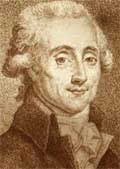 |
Georges-Auguste Couthon
b. 22 Dec 1755, Orcet, Puy-de-Dôme [1]
d. 28 Jul 1794, Paris |
| Title: |
Président de la Convention nationale (President of the National Convention) |
| Term: |
21 Dec 1793 - 5 Jan 1794 |
| Chronology: |
21 Dec 1793,
elected, session of the National Convention, salle des Machines, Palais national des Tuileries, Paris [2] |
|
22 Dec 1794,
assumed the chair, session of the National Convention, salle des Machines, Palais national des Tuileries, Paris [3] |
|
5 Jan 1794,
ceased to exercise the functions of office upon the election of a successor [4] |
| Names/titles: |
Baptised (22 Dec 1755): George (sic!) Couthon [1] |
| Biography: |
| Fourth son of a notary of Orcet, a small village in Auvergne; apprentice of a procureur at Riom, Puy-de-Dôme; studied law at the University of Reims; received license and practiced law in Clermont-Ferrand (from 1783); gained popularity by defending the poor people (avocat des pauvres); appointed president of the Tribunal of the district Clermont-Ferrand (from 1790); elected (9 Sep 1791) as a representative of the département of Puy-de-Dôme to the Assemblée nationale (National Assembly) (1791-1792); suffered from a disease, which completely paralyzed his legs (1788/1789) and confined him to a wheelchair until the end of his life; elected (6 Sep 1792) to the Convention nationale (National Convention) (1792-1794) as a deputy for Puy-de-Dôme; entered the political alliance with Maximilien Robespierre and became one of the principal leaders of the Montagnards; voted for the death sentence in the trial of King Louis XVI; despite his physical disabilities, traveled on missions assigned by the Convention; representative of the Convention (2 Mar 1793 - 30 Apr 1793) to the Principality of Salm for negotiating its attachment to France; appointed member of the Comité de salut public (Committee of Public Safety) (30 May 1793 - 27 Jul 1794); hostile towards the principles of federalism promoted by the Girondins, appeared as a key instigator of the anti-Girondin actions in the Convention on 31 May 1793; took part in the elaboration of the Constitution of 1793; representative of the Convention (21 Aug 1793 - 30 Oct 1793) to the Armies of the Alps and Rhône-et-Loire; directed military operations against the counterrevolutionary forces in Lyon, which surrendered on 9 Oct 1793; served as President of the National Convention (21 Dec 1793 - 5 Jan 1794); participated along with Robespierre and Louis Saint-Just in destruction of the Hébertists and the faction led by Georges Danton; supported Robespierre's promotion of the cult of Supreme Being; contributed to intensifying the Revolutionary Terror by securing the passage of the Law of 22 Prairial, Year II (10 Jun 1794), depriving the accused of their right for legal defense and making death the sole penalty; in the course of the coup of 9 Thermidor, Year II (27 Jul 1794), was indicted together with other revolutionary leaders, including Robespierre and Saint-Just; seized at the Hôtel de Ville (27 Jul 1794) and guillotined (28 Jul 1794). |
| Biographical sources: Dictionnaire des Conventionnels, 158-161;
Dictionnaire des parlementaires français 1789-1889, 2:211-212. |
| Elections: |
| Candidate |
Votes (21 Dec 1793) |
| Georges-Auguste Couthon |
174 |
| voters/absolute majority |
209/105 |
|
| Source of electoral results: Moniteur universel, N° 94, Quartidi, 4 nivôse, l'an 2 de la République Française une et indivisible (24 décembre 1793, vieux stile), p. 379. |
| |
| [1] |
Original baptismal record is preserved in the Archives of the Puy-de-Dôme département, 1741-1770 6 E 260 2, p. 100. It was published in "Memoires de l'Académie des sciences, belles-lettres et arts de Clermont-Ferrand" (Clermont-Ferrand: Ferdinand Thibaud, 1871), 13:415: "L'an mil sept cent cinquante-cinq et le vingt-deuxième décembre après midy a été baptisé George Couthon, fils légitime à Me Joseph Couthon, notaire royal et à demoiselle Marie Lafont ses père et mère habitants de ce lieu et paroisse d'Orcet, né ledit enfant le méme jour." |
| [2] |
Archives parlementaires - Série 1, 81:112;
Procès-verbal de la Convention nationale, 28:22;
Moniteur universel, N° 94, Quartidi, 4 nivôse, l'an 2 de la République Française une et indivisible (24 décembre 1793, vieux stile), p. 379. |
| [3] |
Archives parlementaires - Série 1, 81:112-171. |
| [4] |
Archives parlementaires - Série 1, 83:34;
Procès-verbal de la Convention nationale, 28:339. |

